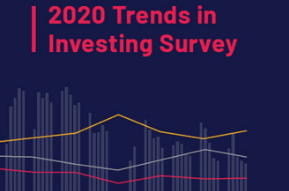Sep
2020
2020 Trends in Investing: ESG Considerations on the Rise
DIY Investor
17 September 2020


The 2020 Trends in Investing Survey, which Janus Henderson conducted in conjunction with the Financial Planning Association® (FPA®) and the Journal of Financial Planning, reveals that environmental, social and governance (ESG) focused investing is gaining popularity among financial professionals and investors in the U.S. Phil Wood, Director of Client Portfolio Management, explains.
Environmental, social and governance (ESG) investing has seen different levels of uptake across the globe. While investors in Europe and Asia have been increasing their focus on ESG factors for several years, U.S. investors have been slower to make the shift toward these considerations within their investment portfolios.
But a new study conducted by the Journal of Financial Planning and the Financial Planning Association® (FPA®) – and sponsored by Janus Henderson Investors – shows that ESG-focused funds are quickly gaining momentum in the U.S. When ESG funds were first added to FPA’s annual Trends in Investing Survey in 2018, 26% of financial professionals surveyed indicated they were currently using or recommending ESG funds with clients.
That percentage remained steady at 26% in 2019 but increased meaningfully to 38% of financial professionals using or recommending ESG funds in 2020.
The 2020 survey findings also indicate that this usage is poised to increase, with nearly one-third of financial professionals saying they plan to increase their use/recommendation of ESG funds over the next 12 months.
This is matched by investor appetite: Almost 40% of financial professionals reported that, in the last six months, clients have asked them about investing in ESG funds.
Notably, the increased interest appears to be translating to substantial growth in ESG fund assets. Recent data from Morningstar indicate an almost fourfold increase in new assets in U.S.-bought ESG funds from 2018 ($5.5 billion) to 2019 ($20.6 billion).1
At Janus Henderson, our portfolio teams are able to incorporate ESG considerations in their processes in ways that best suit the areas of the market in which they invest.
This can be a valuable lens to assess positive and negative factors impacting a business, and our teams are supported as appropriate by a team of Global Responsible Investing experts.
Sustainability Matters
In addition, we have an investment team with a more specific remit of focusing on companies that have a positive impact on the environment and society.
The Janus Henderson Global Sustainable Equity (GSE) Team was an early adopter of the principles of sustainable investment.
The team has long understood that persistent investment returns are generated by companies with resilient, compounding growth characteristics – and that these attributes are more often found in companies that are on the right side of sustainability trends.
Furthermore, they recognize that sustainable investment returns can be generated by companies whose products or services help support the development of a sustainable global economy, often through innovation.
Specifically, this includes businesses that are strategically aligned with what the GSE team see as four key environmental and social megatrends: climate change, population growth, resource constraints and an aging population.
It is too early to say with any certainty what impact the COVID-19 pandemic will have on the appetite for strategies that consider ESG risks and those that invest with specific sustainability criteria.
There seems, however, to be a meaningful shift toward those that seek to deliver better outcomes – not only for investors, but for the environment and for society as well.
2020 Trends in Investing Survey
 Conducted by the Journal of Financial Planning® and the Financial Planning Association® (FPA), and sponsored by Janus Henderson Investors.
Conducted by the Journal of Financial Planning® and the Financial Planning Association® (FPA), and sponsored by Janus Henderson Investors.
Click here to download
1“Money moving into environmental funds shatters previous record.” CNBC, January 14, 2020.
Past performance is not a guide to future performance. The value of an investment and the income from it can fall as well as rise and you may not get back the amount originally invested.
The information in this article does not qualify as an investment recommendation.
For promotional purposes.
Leave a Reply
You must be logged in to post a comment.